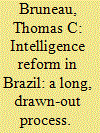| Srl | Item |
| 1 |
ID:
157737


|
|
|
|
|
| Publication |
New Delhi, Pentagon Press, 2018.
|
| Description |
xii, 248p.hbk
|
| Standard Number |
9789386618344
|
|
|
|
|
|
|
|
|
|
|
|
Copies: C:2/I:0,R:0,Q:0
Circulation
| Accession# | Call# | Current Location | Status | Policy | Location |
| 059320 | 355.03/KAN 059320 | Main | On Shelf | General | |
| 059321 | 355.03/KAN 059321 | Main | On Shelf | General | |
|
|
|
|
| 2 |
ID:
163094


|
|
|
|
|
| Summary/Abstract |
Romania faced one of the most dramatic transitions from authoritarian communism to become a democracy and a member of the North-Atlantic Treaty Organization (NATO) and the European Union (EU). The backbone of building a democratic society has been civilian control of the military. This article briefly describes the norms and institutions of democratic control of the intelligence services in Romania and assesses how the mechanisms of democratic control have worked in practice after almost three decades of reform. We argue that many of the post-1989 reforms have been only superficial implemented and monitored, particularly after Romania joined NATO and the EU. The article concludes that the democratic control of intelligence in Romania is an unfinished business. There are structural shortcomings embedded in the process of democracy consolidation that need to be addressed.
|
|
|
|
|
|
|
|
|
|
|
|
|
|
|
|
| 3 |
ID:
139509


|
|
|
|
|
| Summary/Abstract |
In our edited book, Reforming Intelligence: Obstacles to Democratic Control and Effectiveness, Steven Boraz and I argued that intelligence should be analyzed as a subset of civil–military relations. In addition to the three reasons given there—that intelligence is a monopoly of the military in most non-democratic regimes; that even in older democracies including the United States the military plays a very large role in intelligence; and that both exist to ensure national security—another can be added, at least in the case of Brazil, that while democratic civilian control has been achieved, minimal attention and commitment are given to achieving effectiveness.
|
|
|
|
|
|
|
|
|
|
|
|
|
|
|
|
| 4 |
ID:
134058


|
|
|
|
|
| Publication |
2014.
|
| Summary/Abstract |
What is the role of intelligence for counterterrorism? Most studies of counterterrorism ignore the vital role of intelligence, focus only on its most controversial aspects, or fail to recognize how counterterrorism intelligence differs from traditional intelligence issues. This article argues that many of the common criticisms of the CIA and other agencies misunderstand counterterrorism intelligence and what is realistic for gaining information on terrorist groups. In particular, the important role of signals intelligence, liaison relationships, document exploitation, and interrogation are overlooked. In addition, intelligence analysis and the relationship with the policymaker differ fundamentally for counterterrorism. This article emphasizes the need to recognize these differences when evaluating counterterrorism and calls for being cautious with intelligence reform. In addition, it argues for changing US detention policy and making the public more aware of the inevitable gaps related to counterterrorism intelligence.
|
|
|
|
|
|
|
|
|
|
|
|
|
|
|
|